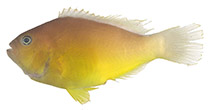| Family: |
Pomacentridae (Damselfishes), subfamily: Pomacentrinae |
| Max. size: |
4.83 cm SL (male/unsexed) |
| Environment: |
reef-associated; marine; depth range 4 - 10 m |
| Distribution: |
Pacific: Wallis Island, Tonga, Fiji and American Samoa. |
| Diagnosis: |
Dorsal spines (total): 9-9; Dorsal soft rays (total): 18-20; Anal spines: 2-2; Anal soft rays: 12-13. This species is distinguished by the following set of characters: D IX,18-20; A II,12-13; pectoral rays 17-18; tubed lateral line scales 33-48; gill rakers 5-6 + 11-12; opercular spinules 8-11; body depth 2.2-2.6 in SL; color generally pinkish brown, usually grading to yellowish or orange on lower side of body including abdomen; white stripe on midline of snout extending posteriorly on forehead and along base of dorsal fin; fins whitish to semi-translucent (Ref. 85605). |
| Biology: |
This species is generally commensal with the anemone Heteractis magnificus (Quoy & Gaimard, 1833) at depths between about 4-10 m (Ref. 85065). Oviparous, distinct pairing during breeding (Ref. 205). Eggs are demersal and adhere to the substrate (Ref. 205). Males guard and aerate the eggs (Ref. 205). |
| IUCN Red List Status: |
Not Evaluated (N.E.) Ref. (130435)
|
| Threat to humans: |
harmless |
Source and more info: www.fishbase.org. For personal, classroom, and other internal use only. Not for publication.

